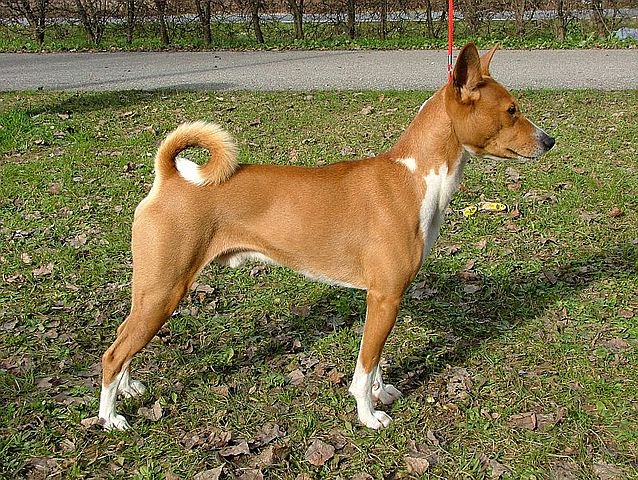The Basenji is an African sighthound with a very distinctive (and entertaining) personality. They have been referred to as extremely cat-like – a trait that either makes them very easy or very difficult to live with, depending upon the person. A prospective owner should make sure this breed is compatible with their lifestyle before making the final decision as to whether or not they would make a good pet for them. It is essential to realize that these dogs are very primitive and independent, which separates them from breeds that were developed to work with people. In fact, Basenjis are so primitive they are one of only a small handful of breeds that comes into season once a year, like wild canids.
The good points: the small size of the Basenji makes them easy to house and transport, without them being too tiny or delicate. Their smooth, low-shedding coat is a breeze to take care of, and they even groom themselves much like cats. They are very easy to housebreak. They are a fairly healthy breed that often lives into the teen years. And most importantly – they don’t bark! Although they are capable of yodeling, howling, growling, and even screaming when they feel like it, this is generally a quiet breed.
The bad points: Basenjis can be extremely destructive and “inventive”, especially when they’re puppies. If they aren’t given things to do they will invent their own games (and not the sort of games most owners are happy about). As mentioned before, they are extremely independent – which can be either a pro or a con, depending upon the owner. They don’t fawn and gush on their owner at all times like some breeds, and may even seem disinterested at times, but they are affectionate… in their own unobtrusive way. And finally, they can prove to be a challenge to train despite being very intelligent – many end up training their owners instead!
Although Basenjis don’t take to training in the same way that other breeds might, they are still trainable as long as the person knows what they are doing. For example, they do best with lots and lots of positive reinforcement. Although rules and boundaries should be upheld, these dogs are extra sensitive and can balk at unnecessarily harsh corrections. Their reputation for being hard to train has nothing to do with them learning slowly or being dumb, in fact the breed tends to learn very quickly! But they will decide whether or not they feel like responding to commands, and act accordingly. Either way, as some Basenjis have tendencies to become dominant and most have tendencies to become stubborn, obedience training is definitely required.
The Basenji is an active breed who needs plenty of regular exercise, although they aren’t the type of dog that will play fetch for hours on end (or often… at all). Instead, they need plenty of time to run in a fenced area, as well as be provided with regular walks. Like all sighthounds, they have a very high prey drive and will chase cats or small woodland animals – which is why they must be kept on leash or behind a secure fence at all times. Take note of the word secure – these dogs are expert escape artists! The younger the dog, the more active he will be although Basenjis of all ages frequently have less of an “off-button” than many other breeds. 
Basenjis do well in all sorts of housing situations including apartments as long as they are exercised frequently, regardless of the weather. They are quite capable of taking a walk in cold weather if given a coat even though they ultimately prefer heat and warmth. Rain is considered the enemy for many Basenjis (most hate getting wet) but if it comes down to a walk in the rain or no exercise at all… an owner should choose the rainy exercise. In whatever type of home they live in, however, they do best in uncluttered living spaces… they can and will get into everything and love to grab objects off the floor!
Because they are fairly quiet, the Basenji does not make a good watchdog. If someone were to break into the house, most of these small sighthounds would just stay out of the way. The breed is naturally wary of strangers, and may or may not even get used to the owner’s friends. They ultimately prefer people who are un-imposing and calm, which means that children may be too much for a Basenji unless the child is perfectly behaved.
When it comes to other animals, small pets such as birds or hamsters are seen as things to be hunted and therefore must be kept in their cages when the Basenji is around. Cats are hit or miss, depending upon the dog and the cat. Basenjis will chase cats who run away from them, but will often befriend self-assured cats with good dog-sense. When it comes to other dogs, these African hounds can be good as long as they had been socialized from a young age to the other family dogs. If no socialization had happened, they can tend toward being territorial, dominant and sometimes even aggressive toward other canines.
The Basenji has a pack mentality and prefers not to be alone for long periods of time, so owners who work all day might need to obtain a second dog – keeping in mind the socialization aspect above. Doggie daycare is an option for some, however this breed can be iffy with strange dogs who aren’t a part of their immediate household. Overall they do best with owners who spend a lot of time at home.
